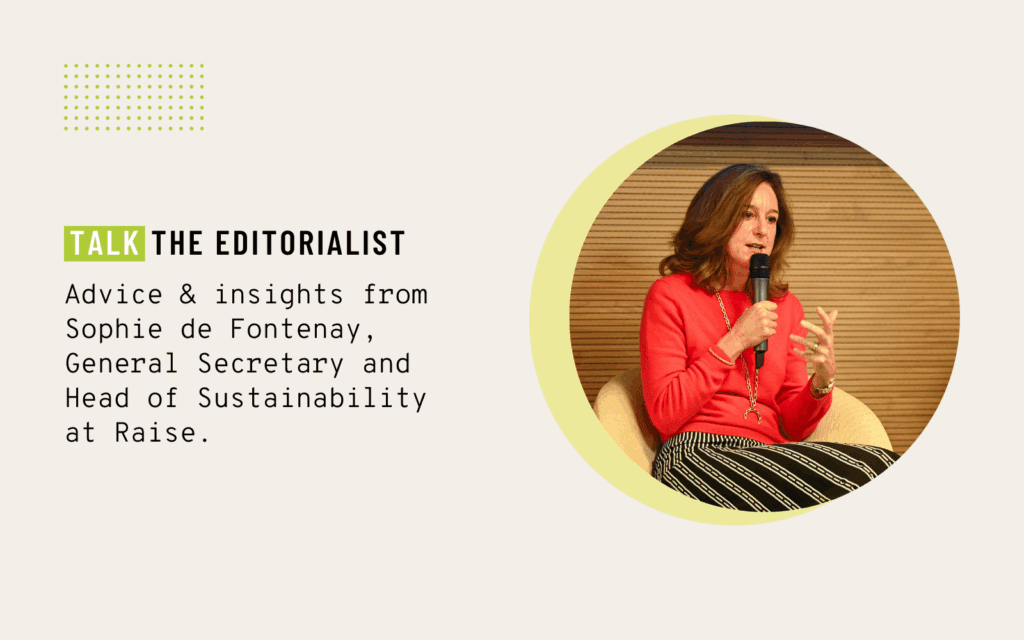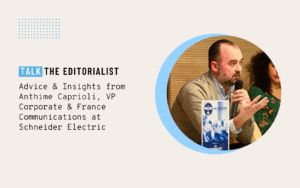Sophie de Fontenay, Group Secretary General and Head of Sustainability at Raise, was a guest speaker at our recent talk “How to tell your sustainable transformation story”. In this conversation, she shares her priorities and her vision for driving impact.
You are both Group Secretary General and Head of Sustainability at Raise. How do these two roles work together?
Sophie de Fontenay: I joined Raise five years ago as Legal, Risk and Compliance Director, and became Head of Sustainability in 2022, before taking on the role of Secretary General in 2024. The functions are naturally complementary. As Secretary General, I oversee strategic, structural issues for the group. As Head of Sustainability, I ensure these considerations are embedded across all our activities, aligning our actions with our mission-driven commitments. At Raise, sustainability and financial performance are not in opposition — they are mutually reinforcing.
How does Raise support the sustainable transition of its portfolio companies?
S. de F.: We work across two key dimensions: ESG, based on monitoring non-financial indicators, and impact, which incorporates intentionality and the measurement of results. Together, these address the full spectrum of sustainability.
Our role is to help the businesses we back integrate these priorities into their operating models. This includes tracking KPIs, providing tailored tools, and giving access to sustainability experts. Some companies completely pivot their model; others add sustainable elements progressively. For some, this is easier by design than for others.
We advocate for progressive change, factoring in a leader’s willingness to champion the transition, showcase their business model, and bring stakeholders on board. We support all our portfolio companies in establishing a board with an ethics programme, backed by clear, measurable actions.
A standout example is Grand Large Yachting, which chose Raise for our ability to guide their ecological transition — notably through initiatives linked to the circular economy and waste sorting.
What challenges do companies face when trying to combine growth and sustainability?
S. de F.: Regulatory requirements are a first challenge, as they demand significant reporting efforts. Our role is to simplify the process and make it as seamless as possible. Internal mobilisation is another key issue: sustainability must become a core element of the corporate project, tangible and coherent at every level.
That means convincing not only the leadership but also employees, so the transformation becomes a collective driver. This is now our core business: investing in companies with strong projects and already engaged teams — and together, amplifying that impact.
Raise is highly engaged with its investor community. What are their expectations, and how do you meet them?
S. de F.: Investors have become far more demanding on ESG topics. They actively challenge our commitments and reporting to ensure they are based on robust, credible measures. This is positive — it pushes the market towards greater professionalism and helps avoid greenwashing.
We are seeing heightened expectations around reporting, but no sign of investor disengagement in Europe. The SFDR regulation works in our favour, as it channels investments towards sustainable finance.
We have also created innovative mechanisms, such as our Sherpas sharing funds, which link philanthropy and entrepreneurship by donating a share of capital gains to social causes. At Raise, we prioritise transparency and use inspiring communication formats — such as newsletters and regular investor exchanges — to foster trust and engagement.
What ecosystem do you draw on to deliver on these commitments and spread best practices?
S. de F.: Our co-founders, Clara Gaymard and Gonzague de Blinières, are personally committed to these issues. Within our leadership team, figures such as Julien Denormandie — former Minister of Agriculture and Food, now Senior Advisor and Comex member at Raise — also play a vital role in promoting our values and practices.
Internally, we have trained, committed teams who understand sustainability and can pass that knowledge on to stakeholders. We also believe the entrepreneurs we support are our best ambassadors: their engagement, combined with our backing, amplifies the reach of our actions.
What are your strategic priorities for the next 18 months?
S. de F.: We have several. First, to develop a biodiversity strategy to support our portfolio companies on this critical topic. Second, to strengthen our presence on the European and international stage — continuing to inspire our peers and promote sustainable investment practices.
Finally, what role should an investment fund like Raise play in the global transition?
S. de F.: Our role is multifaceted: to raise awareness, to provide guidance, and to invest in companies that want to align growth with sustainability. As a mission-led company, we have a duty to lead by example and to be consistent in our approach.
That means making concrete, measurable commitments — and, above all, having the ability to inspire. At Raise, we believe investment can be a powerful lever for building a more sustainable future.



